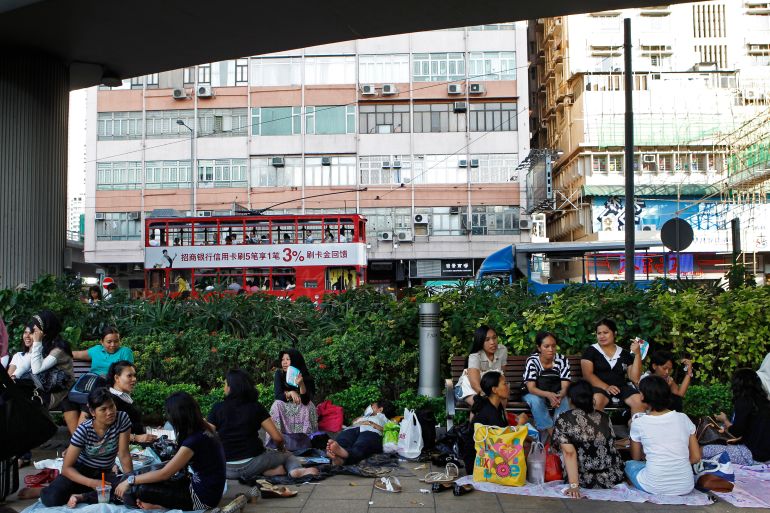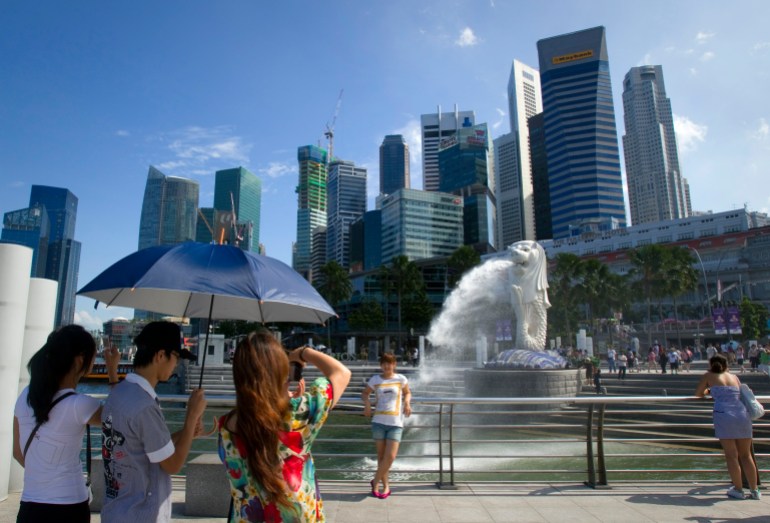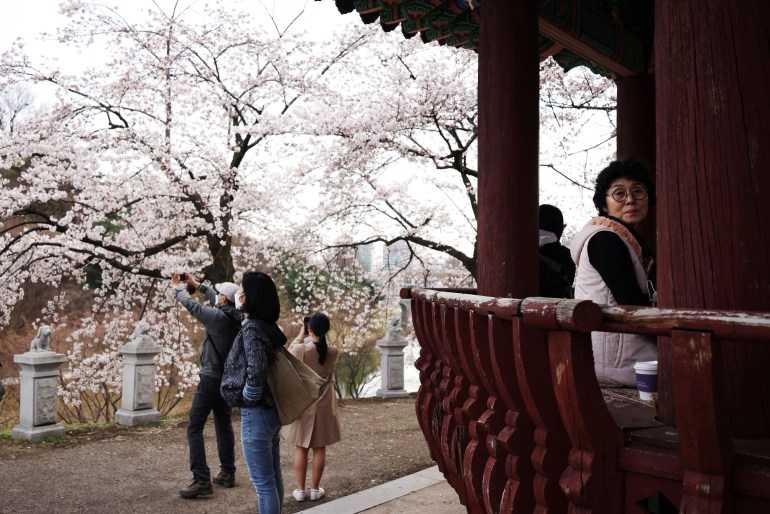In Singapore and Hong Kong, Korean dream tempts domestic helpers
South Korea is considering opening the door to foreign domestic workers as part of efforts to boost record-low birthrate.

Singapore – When Filipino domestic helper Metchie Oyonoyon first read about South Korea’s plans to open its doors to foreign domestic workers, her mind raced with the possibilities.
Given the chance, Oyonoyon would leap at the chance to relocate from Singapore, where she has worked for the last 10 years, to South Korea.
Keep reading
list of 4 itemsCambodia condemned after union leader jailed over casino strike
Photos: May Day rallies across the world
How can workers get a ‘just transition’ amid the climate crisis?
After finishing her household duties and caring for her elderly employer, Oyonoyon, 39, spends most nights tuning into the latest Korean drama via a streaming website on her smartphone.
Oyonoyon’s favourite Korean dramas include Crash Landing on You, Descendants of the Sun, and The Glory, and she counts herself as a fan of stars such as Song Hye-kyo, Son Ye-jin and Lee Do-hyun.
She often binges on episodes all night because she “wouldn’t be able to sleep” without knowing what happens next.
When Oyonoyon is not watching Korean dramas, she whips up spicy kimchi noodles for herself, follows Korean food bloggers and organises outings to Korean buffet restaurants with her domestic worker friends. She dreams of being able to see South Korea in all its four seasons.
“I’m so excited to see the snow there, see people wearing all the coats … It will be something different,” Oyonoyon told Al Jazeera. “I think a lot of domestic workers will want to go there, because of the possibly higher salary and greater freedom.”

Oyonoyon is among hundreds of thousands of domestic workers in Singapore and Hong Kong who may soon have the option of working in South Korea, whose draws include the promise of better conditions and a fantasy of Korean life promoted in popular music, dramas and film.
Desperate to raise the country’s record-low birth rates, South Korea is looking to attract foreign domestic helpers from Southeast Asia to help families with childcare and housework.
The first 100 domestic helpers are expected to begin work later this year as part of a pilot that could be expanded into a full-scale programme modelled along the lines of those operated in Hong Kong and Singapore.
Under the pilot, which is being organised by the Seoul government and the labour ministry, foreign domestic workers will earn the minimum wage of 9,620 won ($7.41) per hour, plus overtime and allowances. Their expected monthly pay of about 2 million won ($1,540) will be up to three times the amount on offer in Hong Kong and Singapore.
The South Korean programme will also provide separate dormitory accommodation, unlike in Hong Kong and Singapore, where domestic helpers are legally required to live with their employers.
While still in its nascent stages, South Korea’s domestic worker programme has the potential to shake up the market for low-wage migrant labour, labour experts say.
South Korea has “better labour market practices for low-wage workers”, including minimum wage and maternity leave benefits and separate accommodation that Singapore does not have, said Laavanya Kathiravelu, an associate professor at the School of Social Sciences at Nanyang Technological University (NTU).
“These factors may make South Korea a more appealing destination for foreign domestic workers,” Kathiravelu told Al Jazeera.

David Bensadon, managing director of Singapore-based employment agency We Are Caring, said that migrant workers typically take into account the subjective appeal of a country when choosing a destination, in addition to practical considerations like salary and work conditions.
South Korea could become the “destination of choice” for many if salary and conditions are set properly, given the popularity of Korean culture and food among domestic helpers, Bensadon told Al Jazeera.
While many details of the pilot are still unknown, South Korea has an “opportunity to implement ethical standards from day one”, he added, such as ensuring that practices are transparent and there are no salary deductions or placement fees.
Bensadon said We Are Caring, which promotes ethical recruitment and hiring practices, will be studying the Korean pilot closely as it is interested in setting up operations in the country following the establishment of offices in Hong Kong and the Philippines.
In Singapore, some observers have expressed concern that the city-state has been complacent about its attractiveness to migrant workers.
Alex Au, vice president of Transient Workers Count Too (TWC2), said South Korea’s proposed scheme should serve as a wake-up call.
“Clearly, the Koreans are embarking on this with a very different model in mind, which may prove to be a good example in terms of hiring employment conditions and so forth, with the question of higher wages, which could potentially damage the attractiveness of a place like Singapore,” Au told Al Jazeera, adding that his organisation has been contacted by South Korean journalists, researchers and members of parliament looking for a rundown of the “pitfalls they should be looking out for”.
“Places like Singapore, which has built its own economy on the model of cheap labour, face a reckoning in the years to come … This domestic worker problem is just the beginning of some serious challenges.”
While it is unclear how many domestic workers might ultimately be lured to South Korea, several helpers working in Singapore or Hong Kong told Al Jazeera they would consider moving to the country.

Achala Perera, a 47-year-old Sri Lankan domestic helper in Hong Kong, said she would like to relocate to a country that doesn’t treat helpers “like robots” after putting up with 16-hour workdays and little time off.
“I heard from friends in Korea who said it has a good environment, good protection for workers … If possible, I’m happy to apply to whichever country to work for a comfortable family. I’m not dependent on one country,” Perera, who earns about 5,000 Hong Kong dollars ($640) a month, told Al Jazeera.
Endang Yusita, an Indonesian domestic worker who has been working in Singapore since 2007, said she would also consider South Korea as she has heard good things about the country, enjoys K-pop acts such as BlackPink and would like to learn the Korean language.
“I heard from my friends that Korea is nice, that it has a good salary also … They said they had to study for six months on how to read and speak Korean,” she said.
Despite South Korea’s positive image among domestic workers, observers warn that living and working in the historically homogenous country may not be smooth sailing.
Since domestic workers in South Korea at present are typically either Korean or Chinese of Korean descent, many households have little familiarity with other cultures, said NTU’s Kathiravelu.
“Southeast Asian domestic workers will come with a different set of cultural norms and expectations, and even different tastes in food,” Kathiravelu said. “So attitudes towards domestic workers may change in terms of their place in the home, and especially as caregivers raising young children. They may be seen in more contractual and temporary terms.”
The lower pay that these domestic workers are likely to receive compared with Koreans or Chinese of Korean descent “will generate a hierarchy of nationality, where Southeast Asian domestic workers are at the bottom,” she added, which could in turn lead to “less respect for these workers”.
“South Korea has had a relatively restrictive immigration regime thus far, so there will need to be a mindset shift so that families become more comfortable with having people from Southeast Asia working in their intimate spaces of the home and looking after their children,” Kathiravelu said.

Meanwhile, Singapore and Hong Kong remain attractive because of their strong rule of law, proximity to source countries and general cultural acceptance of domestic helpers, said Bensadon.
Humanitarian Organization for Migration Economics (HOME), a Singapore-based non-profit that advocates for migrant workers’ rights, said that some domestic helpers may prioritise other considerations even if South Korea offers better pay and conditions.
Some helpers “may prefer to work in countries within South East Asia to remain close to their families, and because of more similarities in terms of culture and languages spoken,” a spokesperson told Al Jazeera.
Despite being a self-confessed Koreaphile, Oyonoyon acknowledges that it could be difficult to pick up Korean and adjust to the country’s cultural norms.
“Domestic helpers like me stay here for so long in Singapore because it’s comfortable and easy to adapt. People speak English, the cooking style is similar, and it’s about three hours away from home … You don’t have to adjust so much,” she said.
Still, Oyonoyon is enthusiastic about her Korean dream.
“If this Korea thing pushes through, I think the language will be a challenge … Maybe I should start practising Korean!”